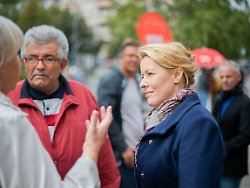Friday October 15, 2021
Flash right, turn left
Giffey was wrong – again
A comment by Thomas Schmoll
After its election victories, the SPD can rule with the traffic light in two federal states and in the federal government, but if at all, it will only be added in the federal government. The SPD turns out to be more left than a Chancellor Scholz would like. In Berlin in particular, it is a question of electoral deception.
Humility is one of the words politicians like to use after every election. The outgoing Minister of Economic Affairs, Peter Altmaier, advised in view of the Union’s “crushing defeat” in the federal elections: “I highly recommend a portion of humility.” The CDU politician actually renounced his parliamentary mandate, which does not happen every day, rather every few decades. It is not without reason that it is said that one “must practice humility”. Wherever training is needed, you can still improve.
The Berlin SPD and its top candidate for the election of the state parliament, Franziska Giffey, still has a lot of catching up to do on this point. As early as May, the Social Democrat presented herself coldly when she resigned as Federal Family Minister because she was threatened with losing her doctorate. “That means I keep my word,” she said almost at the same time as other SPD people such as General Secretary Lars Klingbeil: “People can rely on Franziska Giffey and her word.”
This supposed humility should be evidence of her integrity and fit the image that she later tried to convey on election posters: I am honest, authentic skin. With this self-staging, Giffey reinterpreted a personal defeat as evidence of reliability. Four weeks later, the Free University of Berlin denied her doctorate because it had been obtained through “deception about the independence of her academic achievement”.
“SPD voters bite their clenched fists”
Giffey also deceived the Berliners who wanted to make her mayoress and who trusted her suggestions to forego a new edition of the red-red-green coalition. Almost exactly a year ago, it nourished the hopes of many voters to put an end to R2G, the alliance with a miserable five-year balance sheet, as shown by neglect, garbage, crime, administrative foulness, failed rent caps, expropriation fantasies, a shortage of teachers and traffic jams. “We are developing a pragmatic, citizen-oriented program,” Giffey told the Tagesspiegel in October 2020. That sounded like: if you elect me, you will get a head of government from the center.
On election day, the inability of the red-red-green coalition showed itself in the form of chaotic circumstances, as we know them from autocracies. Such a debacle in Russia and the Greens and the SPD would protest at the UN. But in Berlin it took Andreas Geisel, the Senator for the Interior, who is responsible for election supervision, two weeks before he would make a statement. “Of course, elections have to run correctly. Anything else harms trust in state institutions – and thus democracy as a whole.”
What harms democracy at least as much, if not more, is when politicians lead people behind the spruce, as Giffey did with her decision not to continue talking to the Greens and the FDP about a traffic light coalition, but about a new edition of red-red-green to put. The deputy CDU state chairman, Falko Liecke, is right when he certifies Giffey Wortbruch and says: “Many SPD voters are now biting their clenched fists.”
Giffey does not have her party under control, but vice versa
It is still understandable that Prime Minister Manuela Schwesig in Mecklenburg-Western Pomerania chases the headless CDU from the court in federal and state. The SPD politician wanted to put an end to the grand coalition and preferred to form a two-party alliance instead of putting on a traffic light. In addition, due to Schwesig’s decision, the influence of the CDU in the Federal Council is waning. But the fact that Giffey did not insist on a traffic light instead of flirting with the Left Party gives a deep insight. The SPD state chairman and future head of government does not have her party under control, but vice versa.
Giffey had made the traffic light her favorite option. She won the victory for the SPD. In gratitude, the comrades let them down at the first opportunity and show them off. Giffey also makes a fitting face to the inappropriate game. Her buckling “after careful consideration” she clouded over with political speech: She announced a “decade of investment” – but the country is chronically clammy and is currently spending almost 2.5 billion euros on a few thousand apartments for the Vonovia Group.
SPD reveals its strategic ineptitude
The waiver of a traffic light coalition speaks neither for the Greens nor for the SPD. The FDP is one of two parties that Scholz and his Social Democrats urgently need in order to elect him as Chancellor of a “climate government”. The Berlin approach is definitely not a signal of trust. It is evidence of the strategic incompetence in the ranks of the SPD, which Scholz was able to whitewash in the election campaign, but which is scary for his potential reign – if the FDP stays in the boat at all. Scholz cannot rely on his party either.
After the Berlin decision, the desire for a coalition with the SPD and the Greens in the federal government will not have grown among the members of the Liberals. As FDP leader Christian Lindner said so beautifully: “It is better not to govern than to govern wrongly.” He was scolded a lot for it.
What Giffey does is worse. It is voting fraud close to fraud. If she were courageous and with integrity, she would declare her resignation. The Social Democrat would rather give in and make the next promise, which she will probably break: “There will be no simple ‘business as usual’. We need a fresh start for Berlin.” Hopefully it starts with a repetition of the election.
